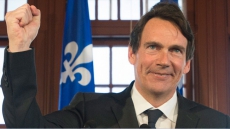OTTAWA - When the federal environment commissioner reported this week that Canada would not meet its 2020 international commitment on greenhouse gas emission cuts, no one was surprised.
The Conservative government of Prime Minister Stephen Harper has been saying for years that it would not sacrifice economic competitiveness — particularly in the oil and gas sector — for environmental gains.
But eight years after trumpeting to the world Canada's "emerging energy super power" aspirations, the phrase appears to have fallen out of fashion with the Harper government.
Despite current record numbers in the oil sector, there are troubling clouds on the horizon that could rain on the Conservatives' pro-growth energy policies.
Michael Cleland, the Nexen executive-in-residence at the Canada West Foundation, wrote in 2007 that the government's "energy super power" terminology was — as he puts it now — "kind of stupid."
Events, he said in an interview, have borne that out.
First, the good economic news.
Last week, Canada hit three million barrels a day of oil exports to the United States for the first time ever, while also shipping out its first tanker of Alberta bitumen to Europe.
Crude oil exports climbed from 1.77 million barrels per day in 2006 to 2.59 millions barrels per day in 2013, according to Natural Resources Canada, and some $19.6 billion was invested in Canada's oil and gas producers in the first eight months of 2014, putting the country on track to surpass the record $25.5 billion invested in 2007.
"Money is being shovelled into the Canadian oil and gas industry like coal into a furnace," according to a report last month from ARC Financial Corp., a private equity firm specializing in the sector.
Yet not all is well on the oil and gas front:
— Three years after Harper called the Keystone XL pipeline from Alberta to the U.S. Gulf Coast a "no-brainer," the White House has yet to approve the project amid massive environmental protests.
— The proposed Northern Gateway pipeline to Kitimat, B.C., remains beset by public antipathy and threats of First Nations lawsuits despite conditional approval by the National Energy Board.
— A Quebec court has temporarily suspended exploratory drilling for an oil terminal in eastern Quebec that is key to TransCanada's proposed Energy East pipeline project.
— Malaysian oil and gas giant Petronas is currently threatening to pull out of its promised multibillion-dollar liquefied natural gas project in British Columbia, while Norway's Statoil put a major oil sands investment on hold last month.
— Total and Suncor Energy Inc. put their $11-billion Joslyn North oilsands project on hold indefinitely earlier this year.
In June, the Canadian Association of Petroleum Producers predicted rising costs would slow the previously anticipated growth in oilsands production growth, while a glut of American shale oil and gas combined with moderating global demand is causing analysts to predict flat or declining prices for years.
Last week, the benchmark price for Brent crude oil fell below $90 a barrel, continuing a three-month slide.
"In fairness to the government," said Cleland, the former CEO of the Canadian Gas Association, "I don't think they could have anticipated all of (the impediments to energy growth), whether it's on the demand side or the public support side or dealing with climate change, or just the normal vicissitudes of energy markets."
But Cleland says those external factors have been exacerbated by Conservative policy decisions they should have anticipated would cause major public blow-back, especially on the pipeline front.
Natural Resources Minister Greg Rickford was not available for an interview but his office provided a slew of data to bolster its contention that Canada's energy sector is booming.
"We have no reason to moderate expectations for growth and see huge potential in emerging markets," spokesman Chris McCluskey said in an email.
Andrew Leach, the Enbridge Professor of Energy at the University of Alberta, said current oil production is not the issue.
"The impact that this government is having is not on production today," said the energy economist.
"This is a longterm industry. So things the government has done in the last two and a half years have created more uncertainly and have stoked some of the opposition. That leads to long-run impacts."
Cleland argues public suspicions were raised needlessly by burying controversial environmental changes in omnibus budget bills and curtailing debate, which silenced a full airing of the pros and cons of the moves.
Cleland was also sharply critical of the government's decision to politicize the National Energy Board by giving the cabinet final approval.
"The loss of public support, I think it borders on being crippling," said the industry executive.
Leach also contends the government should have served as a "broker" between energy project proponents and objectors.
"They chose the opposite approach," he said.
"They chose to kick sand in the face of the environmental movement in Canada. They chose to talk down to American objections. They chose to take a very heavy-handed approach in terms of talking up the possibility of not needing the U.S. market."
In fact, Canadian oil exports to the United States have increased 59 per cent over the past decade, according to data compiled by the U.S. Energy Information Administration.
As the Keystone XL pipeline delay illustrates, that leaves Canada's energy sector vulnerable to American domestic politics and public opinion.
Leach argues there was an "opportunity for the government to show some serious progress, not just on (reducing) GHGs, but on the environment and the oil sands in general."
The irony is that by failing to aggressively address Canada's greenhouse gas emissions, the government may have actually hobbled the longterm economic prospects of the oil sands while trying to protect them.
Cleland lays much of the blame at the feet of the previous Liberal government, which wildly over-promised on GHG cuts in the Kyoto Accord and then failed to deliver.
"We managed to make ourselves the poster child for not doing the right thing on climate," said Cleland.
"That's made a big difference in terms of international perspective."
The oil sands, meanwhile, will have difficulty attracting investment if projections of flat or falling oil prices continue. As Cleland puts it, if the future price per barrel is projected as closer to $80 than $100, "a lot of these projects are pretty dubious at that price."
"Those are all things out in the world over which Canada has no control. Never did, never will."
Leach also notes the Harper government cancelled the accelerated capital cost allowance on oil sands projects, altered the ground rules with China on foreign investment and changed the tax treatment of income trusts — which affected many mid-size oil and gas production and processing companies.
Add it all up and that goal of becoming an energy super power remains elusive.
"If this were a Liberal government, or an NDP government, and this were the outcome, I don't think (Conservatives) would be cheering from the opposition benches," Leach concluded.





